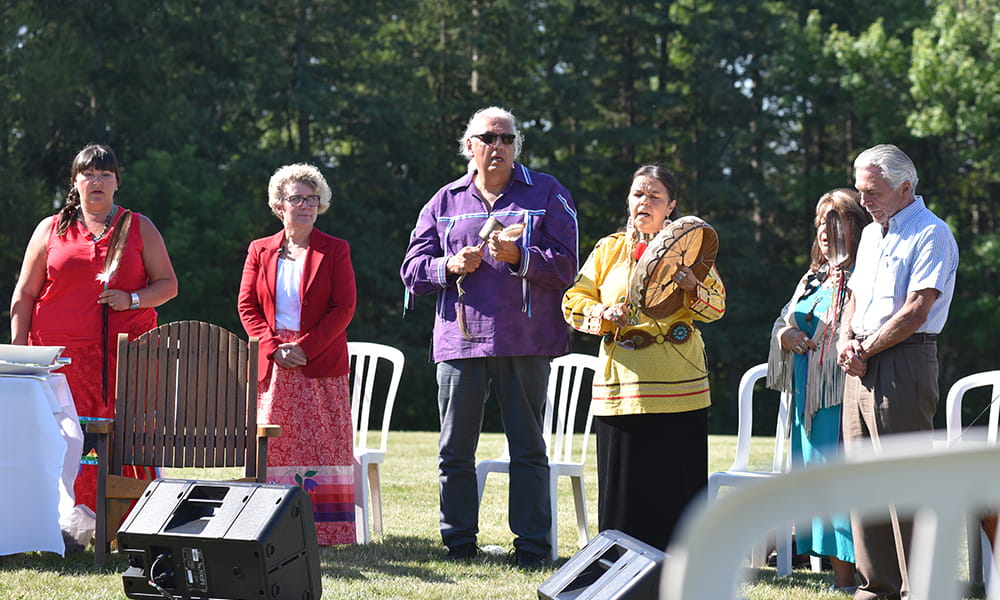The Nuclear Waste Management Organization (NWMO) is taking a significant step towards reconciliation by acknowledging historical wrongs in Canada’s past and the need to create a better future by addressing the challenges of today.
This acknowledgment forms part of the NWMO’s Reconciliation Statement, which was finalized through an Indigenous ceremony. Members of the Council of Knowledge Holders, NWMO Board of Directors and senior leadership took part in a Pipe Ceremony led by Elder Fred Kelly and in a traditional gift exchange.
“We are privileged to have many Indigenous voices – on the Council of Elders and Youth, in the communities with which we work, on our Board of Directors, and on our staff – guiding us in our journey towards reconciliation,” said Laurie Swami, President and CEO of the NWMO. “Together, we are thinking deeply about reconciliation and have formed a statement that will give our approach meaning and direction.”
The statement recognizes the NWMO’s ongoing involvement, collaboration and discussions with Indigenous (First Nation and Métis) communities and all those involved with implementing Canada’s plan for the long-term management of used nuclear fuel.
It is also part of the NWMO’s response to calls to action by the Truth and Reconciliation Commission of Canada in 2015. It is the organization’s initial response to Section 92, which calls for the corporate sector to build respectful relationships with Indigenous peoples, and provide education for management and staff on the history of Indigenous peoples, including the history and legacy of residential schools.
“The NWMO is demonstrating leadership by interweaving First Nation and Métis voices and Indigenous Knowledge systems into its ongoing work,” said Elder Diane Longboat. “Taking an active role in reconciliation and responding to the recommendations of the Truth and Reconciliation Commission will serve the NWMO well as it works to build meaningful relationships founded on mutual trust and collaboration with First Nation and Métis peoples, their organizations and communities.”
Building on the statement, the NWMO is now working on a Reconciliation Policy. The policy will include an implementation strategy to measure annually the organization’s progress and commitment to Indigenous peoples and their history and future.
The NWMO's Reconciliation Statement reads as follows:
In the context of reconciliation, the Nuclear Waste Management Organization (NWMO) recognizes historical wrongs in Canada’s past and the need to create a better future by addressing the challenges of today. The NWMO Council of Elders and Youth speaks of this journey as a new era for humanity – a time of reconciliation with First Nation, Métis and Inuit peoples.
The NWMO is committed to contribute to reconciliation in all its work by co-creating a shared future built on rights, equity and well-being. In addition, the NWMO will establish a Reconciliation Policy with an implementation strategy that will be measured annually and publicly reported to contribute to the Truth and Reconciliation Commission’s calls to action.
The NWMO’s acknowledgment and commitment to a new policy builds on a strong foundation of interweaving Indigenous Knowledge into decision-making. Since its inception in 2002, the NWMO has worked hard to engage respectfully with Indigenous communities. The organization continually seeks and receives advice from the Council of Elders and Youth.
The NWMO’s Aboriginal Policy and Indigenous Knowledge Policy, adopted in 2009 and 2016 respectively, provide guidance and inform its work.
“Upon this good track record, we are contributing to reconciliation,” said Bob Watts, Vice-President of Indigenous Relations at the NWMO. “This means co-creating a different future based on fairness, equality and respect. The Reconciliation Statement says we are going to jointly hold that pen; we are going to jointly imagine and design how to move into the future together. There is a power and energy associated with that that is going to be really profound.”
In addition, all NWMO staff and contractors receive training in Indigenous cultural awareness, and important corporate occasions and milestones are celebrated through ceremony, an approach consistent with the finalization of the Reconciliation Statement.
Canada's plan
The NWMO issues Reconciliation Statement collaboratively with Indigenous Elders and youth

NWMO Board member Ron Jamieson (right) honoured ahead of the signing of the Reconciliation Statement.
About the NWMO
The Nuclear Waste Management Organization (NWMO) is a not-for-profit organization tasked with the safe, long-term management of Canada’s used nuclear fuel inside a deep geological repository, in a manner that protects people and the environment for generations to come.
Founded in 2002, the NWMO has been guided for more than 20 years by a dedicated team of world-class scientists, engineers and Indigenous Knowledge Holders that are developing innovative and collaborative solutions for nuclear waste management. Canada’s plan will only proceed in an area with informed and willing hosts, where the municipality, First Nation and Métis communities, and others in the area are working together to implement it. The NWMO plans to select a site in 2024, and two areas remain in our site selection process: the Wabigoon Lake Ojibway Nation-Ignace area in northwestern Ontario and the Saugeen Ojibway Nation-South Bruce area in southern Ontario.
The Nuclear Waste Management Organization (NWMO) is a not-for-profit organization tasked with the safe, long-term management of Canada’s used nuclear fuel inside a deep geological repository, in a manner that protects people and the environment for generations to come.
Founded in 2002, the NWMO has been guided for more than 20 years by a dedicated team of world-class scientists, engineers and Indigenous Knowledge Holders that are developing innovative and collaborative solutions for nuclear waste management. Canada’s plan will only proceed in an area with informed and willing hosts, where the municipality, First Nation and Métis communities, and others in the area are working together to implement it. The NWMO plans to select a site in 2024, and two areas remain in our site selection process: the Wabigoon Lake Ojibway Nation-Ignace area in northwestern Ontario and the Saugeen Ojibway Nation-South Bruce area in southern Ontario.
